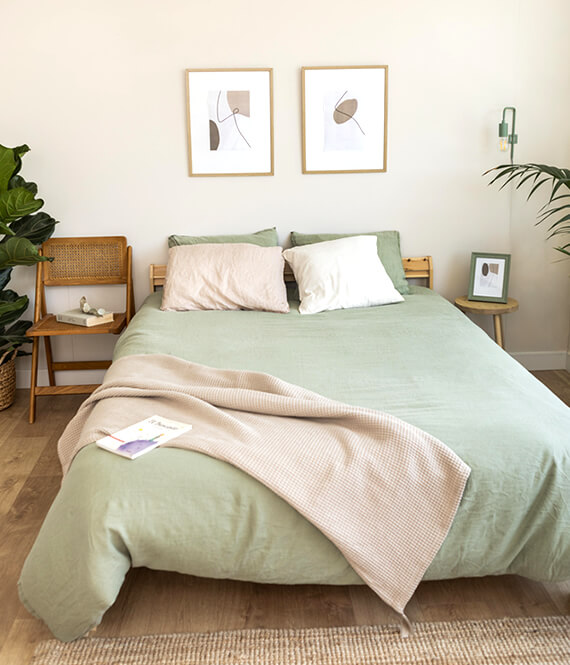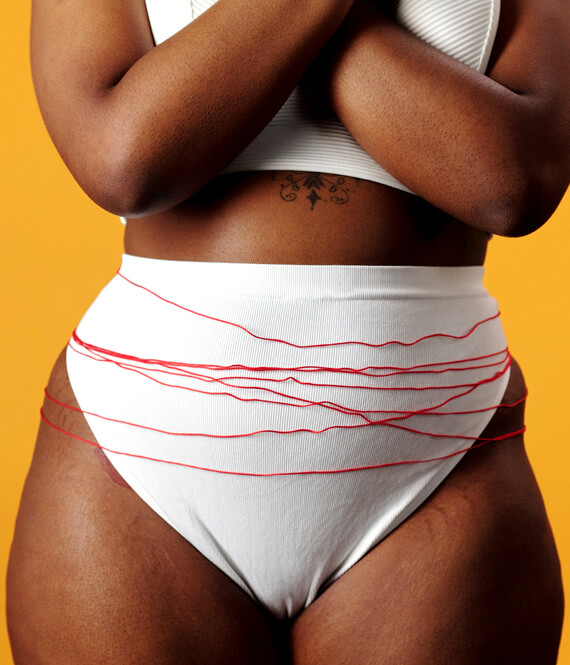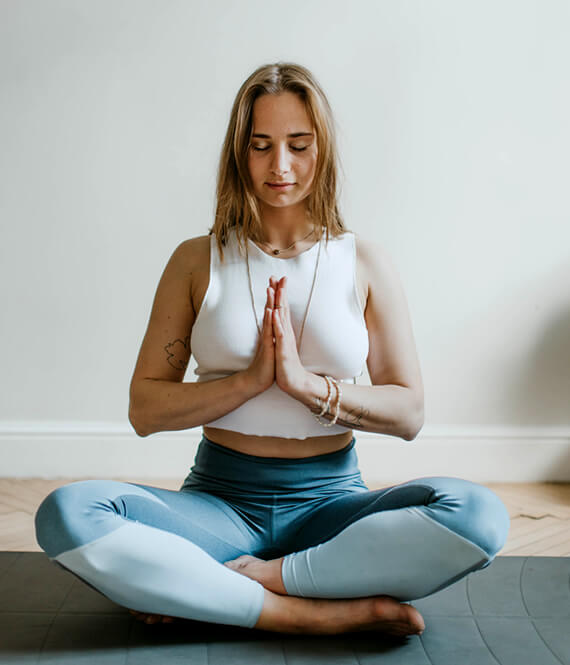
How To Create a Bedroom That Promotes Quality Sleep
We recommend helpful products in our articles. Read our full disclosure here. The content on this website is not intended to be a substitute for professional advice, diagnosis, or treatment.
There’s no better feeling than falling into bed after a long, exhausting day.
Except when you can’t fall asleep.
Do you find yourself tossing and turning for hours, unable to find a comfortable sleeping position despite being tired?
Numerous things can cause sleepless nights including anxious thoughts, frequent trips to the bathroom, outside distractions, and an uncomfortable mattress.
If you’re struggling to fall and stay asleep at night, your bedroom setup may be to blame.
By making small adjustments to your surroundings, you can promote quality sleep that leaves you feeling restored, rejuvenated, and energized.
Keep reading for tips on creating a bedroom oasis so you can finally get the restful night’s sleep you deserve.
Reduce Noise Distractions
Noisy neighbors, nearby traffic, and even a noisy bedmate can all make it difficult to fall and stay asleep.
External noises can disturb your sleep cycle without you even realizing it.
While you can’t completely eliminate all outside distractions, you can implement a few techniques for reducing unwanted interruptions.
For outside noises beyond your control, like traffic or neighbors, investing in a comfortable pair of earplugs or a white noise machine can help block out these unwanted intrusions.
White noise machines offer soothing sounds like rain, running water, and other natural sounds.
You can also use a fan or another source of white noise to blur background noises.
If your partner is snoring, try repositioning them so they aren’t sleeping on their back.
If the problem persists, it may be a sign of a serious sleep disorder known as sleep apnea.
Turn Down the Lights and Power Off Your Electronics
Loud noises aren’t the only things that can disrupt your quiet bedroom sanctuary.
Bright lights and electronics are also common culprits.
Try to eliminate any bright lights from your bedroom, including both indoors and outdoors.
Room darkening shades are a great way to block unwanted lights from the street or your neighbors from filtering into your bedroom.
You can also use a comfortable sleep mask.
Blue light is especially harmful to your body’s natural sleep cycle.
This is the type of light emanating from your favorite electronics including smartphones, tablets, and televisions.
Not only do the sounds and motions on the screen stimulate your brain but the light itself negatively interferes with your body’s circadian rhythm or internal clock.
Your circadian rhythm controls your body’s production of the sleep hormone melatonin.
Incoming light from the optic nerves in your eyes relays information to your brain.
When you use electronic devices too close to bedtime, your brain signals your body to be awake.
Instead, swap your smartphone for a journal, book, or other relaxing bedtime activity.
Getting plenty of sun and vitamin D exposure during the day can also promote better sleep at night when the sun goes down.
If putting down your phone before bed is a work in progress, slide on a pair of blue light blocking glasses to minimize the effect of blue light.
Invest in Quality Bedding
Finding the perfect mattress, pillows, and bedding is key for achieving quality sleep and creating a bedroom oasis.
Choose a mattress that offers both support and comfort.
For some people, this means a firm mattress while others prefer something softer and more forgiving.
You may need to experiment until you find the perfect fit.
You can also consider an adjustable bed that lets you modify the firmness based on your needs.
But your mattress isn’t the only thing to consider.
You also need pillows that support your neck and back and bedding that keeps you cool and comfortable.
Moisture-wicking fabrics like cotton, linen, silk, wool, and bamboo are best.
Buckwheat hull pillows enhance sleep quality through customized support, even pressure distribution, natural breathability, hypoallergenic properties, durability, and reduced sleep disruptions.
While some may notice the rustling sound initially, it can serve as a calming, sleep-inducing white noise.
Overall, buckwheat hull pillows provide personalized support, comfort, and breathability, contributing to improved sleep quality.
On the other hand, the texture of flannel sheets traps body heat, making them an excellent choice for colder seasons.
They are made from brushed cotton fabric, creating a soft, fuzzy surface, and are available in a wide range of designs, colors, and patterns.
Having multiple flannel sheet sets means you can switch them out as needed to ensure a comfortable temperature throughout the year.
Depending on the climate where you live, you may also need to change your bedding from one season to the next to prevent overheating.
Find the Perfect Temperature
Speaking of overheating, maintaining the right bedroom temperature promotes deep, restorative sleep and reduces how often you wake up during the night.
According to research, the best temperature for sleep is 65 degrees Fahrenheit.
Try setting your thermostat between 60 and 70 degrees.
Paired with the right bedding, you can remain cool and comfortable throughout the night.
Your body temperature naturally lowers at night, preparing for sleep.
This is one reason a warm bedroom can negatively impact your sleep quality.
As your internal body temperature rises, so does your blood pressure, causing you to feel more aroused.
This can also trigger night sweats and disrupted sleep. In an effort to cool down, you may find yourself tossing, turning, and kicking off the covers.
Even if you don’t fully awake during these episodes, they still disrupt your sleep cycle.
Try cracking open a window (while being mindful of outside light and noise), using a ceiling or electric fan, or investing in lightweight pajamas and sheets.
Additionally, indoor plants can act as natural insulators, creating a microclimate that buffers temperature extremes, thus making the room feel more comfortable year-round.
They regulate humidity levels by releasing moisture through transpiration, which can warm the room in dry conditions and provide a cooling effect in hot weather.
Some plants also purify the air, removing pollutants and allergens, further enhancing your sleep quality.
Beyond their practical benefits, indoor plants can create a soothing and aesthetically pleasing atmosphere, contributing to psychological comfort.
While indoor plants can regulate temperature, they should be part of a comprehensive approach that includes proper insulation and climate control for optimal comfort.
Eliminate Clutter
Who knew that cluttered shelves and dirty laundry on the floor could actually be disrupting your sleep?
If there was ever a good reason to tidy up your bedroom, this is it!
A disorganized or messy bedroom can make it difficult to fall asleep.
Clutter acts as an unwanted distraction and may prevent you from feeling fully relaxed.
Try organizing your bedroom and giving everything a designated space.
If your bedroom has a desk, keep it free from paperwork by storing it in a filing cabinet or desk drawer.
Don’t leave your clothes on the floor or at the end of your bed.
Make sure all your dirty laundry is stowed away in a closed hamper and your clean clothes are put away in your dresser or closet.
Avoid cluttering your nightstand with too many odds and ends.
Only keep necessities by your bedside like a glass of water.
If you keep your smartphone charging beside your bed, be sure to keep it face down to eliminate both blue light and the temptation to check your messages or emails.
The more organized and clean your bedroom is, the less distracted you’ll be and the easier it’ll be to relax and prepare for sleep.
Designate Certain Bedroom Activities
If you spend a lot of time in your bedroom, chances are you’re performing all sorts of activities from working and eating to socializing or even exercising.
This is especially true if your home or apartment has limited space.
As hard as it might be, it’s important to reserve your bedroom for nighttime activities only.
When you perform “awake” activities in your bedroom, it confuses your brain into thinking it’s okay or expected to be awake and alert when in bed.
Instead, designate other areas of your living space for these tasks.
For example, set up a desk or small office outside of your bedroom for work.
If you exercise at home, build a small fitness area in your garage or spare room.
Avoid eating in bed or even using your smartphone.
Your bed should be designated for sleep and sex only.
It’s also recommended you don’t lay awake in bed for more than 15 to 20 minutes at a time.
If you’re struggling to fall asleep and this much time lapses, get up and perform a relaxing activity before returning to bed.
Avoid turning on lights or using electronic devices.
Instead, meditate, perform a breathing exercise, or have a hot cup of tea.
Once you feel tired enough to fall asleep, return to bed.
Doing this will help strengthen the connection between your bedroom and sleep.
This is just one way to change your behaviors and thoughts regarding sleep, which is the premise of using CBT for insomnia.
By changing the way you think about sleep and adopting healthier patterns of behavior, you can promote quality rest, a healthy circadian rhythm, and more restorative sleep.
Improving Your Environment Can Improve Your Sleep Quality
The answer to a good night’s sleep might be hiding right behind your bedroom door.
Your bedroom should be a relaxing oasis for sleep.
That means limiting outside distractions and promoting relaxation.
These small changes can have a big impact on how well and how long you sleep.
Remember, investing in your bedroom setup is an investment in your sleep quality and overall health and well-being.
Browse the rest of the blog for more tips on living a happy, healthy life.
"We love to research problems, examine studies, analyze solutions, and share with you ideas that make life healthier. You can learn about us and our editorial standards here. Have suggestions or feedback to share? Send us a message!."













Leave a Comment